UNCC300: Catholic Social Teaching on Racism & Common Good in Australia
VerifiedAdded on 2023/05/27
|5
|1683
|371
Essay
AI Summary
This essay reflects on the issue of racism in Australia and its challenge to the common good, examined through the lens of Catholic Social Teaching (CST) principles. It argues that racism, viewed as a violation of human dignity and equality, directly contradicts CST principles such as the sanctity of human life, rights and responsibilities, and solidarity. The essay highlights how racism undermines the creation of a just and peaceful society by fostering fear, discrimination, and unequal treatment. It references the author's personal experiences and observations, emphasizing the importance of addressing racism through legal measures and promoting education that fosters respect and understanding among all people. The essay concludes by advocating for the application of CST principles to combat racism and build a more inclusive and equitable society. Desklib provides students with access to similar essays and study tools.
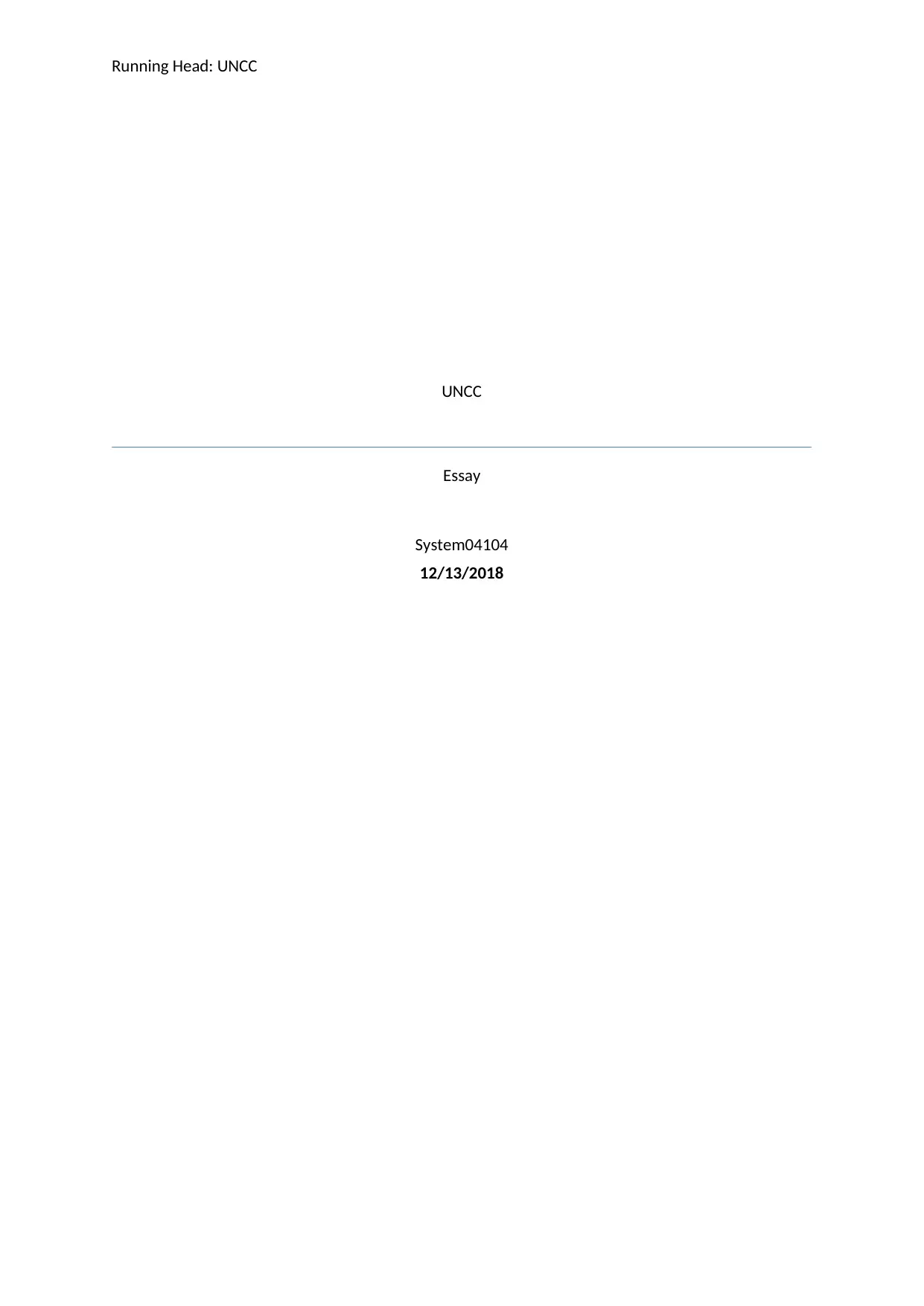
Running Head: UNCC
UNCC
Essay
System04104
12/13/2018
UNCC
Essay
System04104
12/13/2018
Paraphrase This Document
Need a fresh take? Get an instant paraphrase of this document with our AI Paraphraser
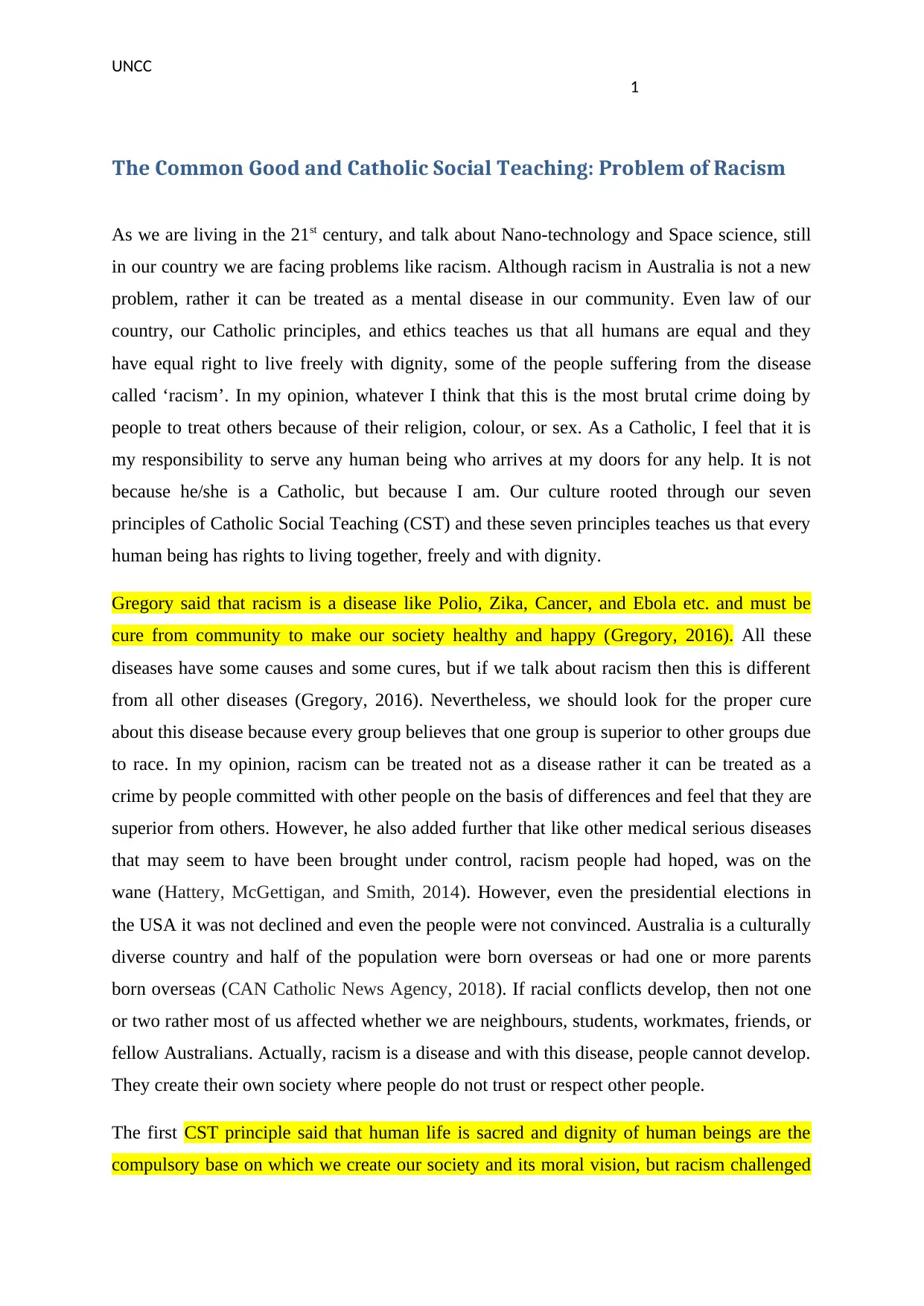
UNCC
1
The Common Good and Catholic Social Teaching: Problem of Racism
As we are living in the 21st century, and talk about Nano-technology and Space science, still
in our country we are facing problems like racism. Although racism in Australia is not a new
problem, rather it can be treated as a mental disease in our community. Even law of our
country, our Catholic principles, and ethics teaches us that all humans are equal and they
have equal right to live freely with dignity, some of the people suffering from the disease
called ‘racism’. In my opinion, whatever I think that this is the most brutal crime doing by
people to treat others because of their religion, colour, or sex. As a Catholic, I feel that it is
my responsibility to serve any human being who arrives at my doors for any help. It is not
because he/she is a Catholic, but because I am. Our culture rooted through our seven
principles of Catholic Social Teaching (CST) and these seven principles teaches us that every
human being has rights to living together, freely and with dignity.
Gregory said that racism is a disease like Polio, Zika, Cancer, and Ebola etc. and must be
cure from community to make our society healthy and happy (Gregory, 2016). All these
diseases have some causes and some cures, but if we talk about racism then this is different
from all other diseases (Gregory, 2016). Nevertheless, we should look for the proper cure
about this disease because every group believes that one group is superior to other groups due
to race. In my opinion, racism can be treated not as a disease rather it can be treated as a
crime by people committed with other people on the basis of differences and feel that they are
superior from others. However, he also added further that like other medical serious diseases
that may seem to have been brought under control, racism people had hoped, was on the
wane (Hattery, McGettigan, and Smith, 2014). However, even the presidential elections in
the USA it was not declined and even the people were not convinced. Australia is a culturally
diverse country and half of the population were born overseas or had one or more parents
born overseas (CAN Catholic News Agency, 2018). If racial conflicts develop, then not one
or two rather most of us affected whether we are neighbours, students, workmates, friends, or
fellow Australians. Actually, racism is a disease and with this disease, people cannot develop.
They create their own society where people do not trust or respect other people.
The first CST principle said that human life is sacred and dignity of human beings are the
compulsory base on which we create our society and its moral vision, but racism challenged
1
The Common Good and Catholic Social Teaching: Problem of Racism
As we are living in the 21st century, and talk about Nano-technology and Space science, still
in our country we are facing problems like racism. Although racism in Australia is not a new
problem, rather it can be treated as a mental disease in our community. Even law of our
country, our Catholic principles, and ethics teaches us that all humans are equal and they
have equal right to live freely with dignity, some of the people suffering from the disease
called ‘racism’. In my opinion, whatever I think that this is the most brutal crime doing by
people to treat others because of their religion, colour, or sex. As a Catholic, I feel that it is
my responsibility to serve any human being who arrives at my doors for any help. It is not
because he/she is a Catholic, but because I am. Our culture rooted through our seven
principles of Catholic Social Teaching (CST) and these seven principles teaches us that every
human being has rights to living together, freely and with dignity.
Gregory said that racism is a disease like Polio, Zika, Cancer, and Ebola etc. and must be
cure from community to make our society healthy and happy (Gregory, 2016). All these
diseases have some causes and some cures, but if we talk about racism then this is different
from all other diseases (Gregory, 2016). Nevertheless, we should look for the proper cure
about this disease because every group believes that one group is superior to other groups due
to race. In my opinion, racism can be treated not as a disease rather it can be treated as a
crime by people committed with other people on the basis of differences and feel that they are
superior from others. However, he also added further that like other medical serious diseases
that may seem to have been brought under control, racism people had hoped, was on the
wane (Hattery, McGettigan, and Smith, 2014). However, even the presidential elections in
the USA it was not declined and even the people were not convinced. Australia is a culturally
diverse country and half of the population were born overseas or had one or more parents
born overseas (CAN Catholic News Agency, 2018). If racial conflicts develop, then not one
or two rather most of us affected whether we are neighbours, students, workmates, friends, or
fellow Australians. Actually, racism is a disease and with this disease, people cannot develop.
They create their own society where people do not trust or respect other people.
The first CST principle said that human life is sacred and dignity of human beings are the
compulsory base on which we create our society and its moral vision, but racism challenged
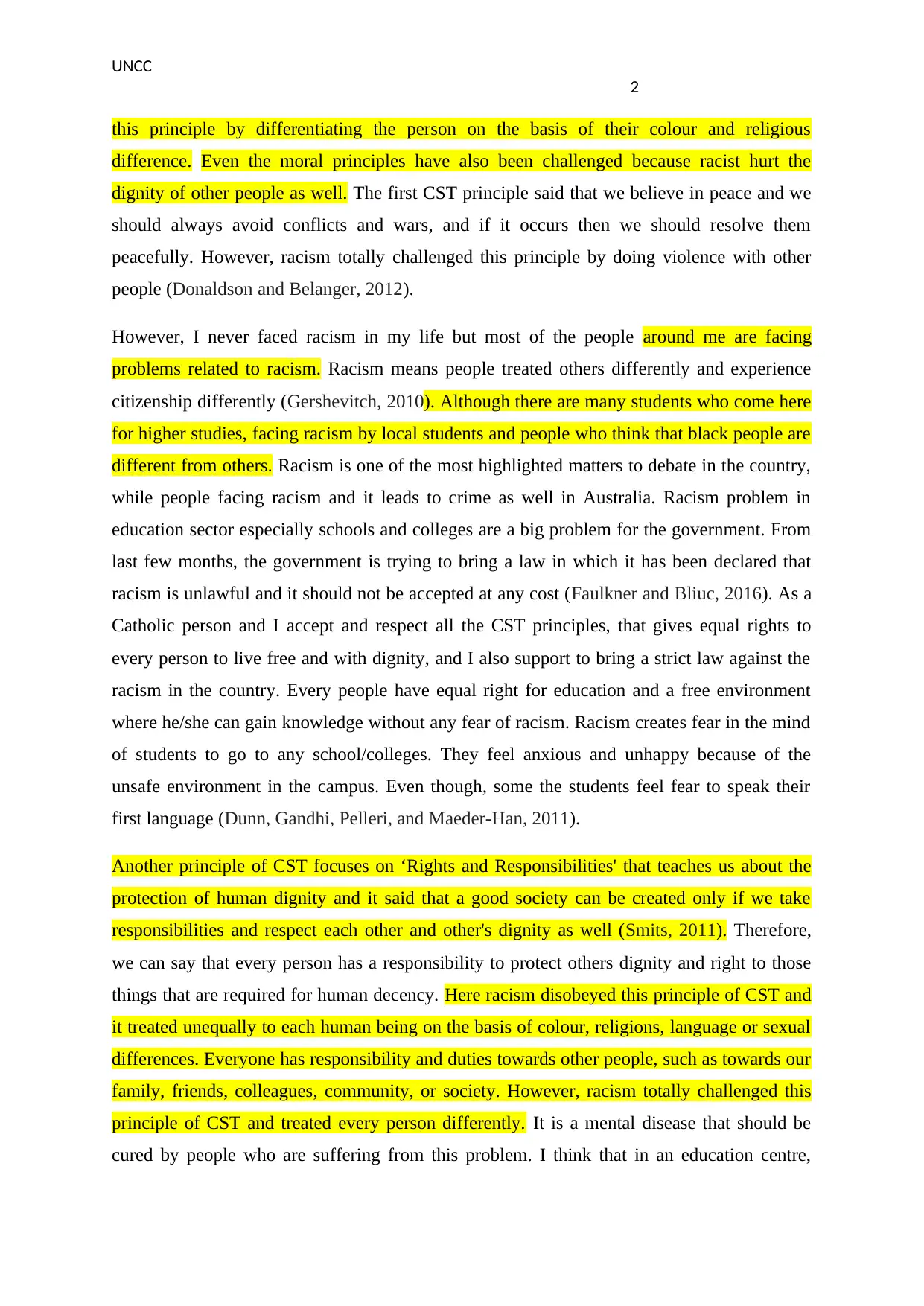
UNCC
2
this principle by differentiating the person on the basis of their colour and religious
difference. Even the moral principles have also been challenged because racist hurt the
dignity of other people as well. The first CST principle said that we believe in peace and we
should always avoid conflicts and wars, and if it occurs then we should resolve them
peacefully. However, racism totally challenged this principle by doing violence with other
people (Donaldson and Belanger, 2012).
However, I never faced racism in my life but most of the people around me are facing
problems related to racism. Racism means people treated others differently and experience
citizenship differently (Gershevitch, 2010). Although there are many students who come here
for higher studies, facing racism by local students and people who think that black people are
different from others. Racism is one of the most highlighted matters to debate in the country,
while people facing racism and it leads to crime as well in Australia. Racism problem in
education sector especially schools and colleges are a big problem for the government. From
last few months, the government is trying to bring a law in which it has been declared that
racism is unlawful and it should not be accepted at any cost (Faulkner and Bliuc, 2016). As a
Catholic person and I accept and respect all the CST principles, that gives equal rights to
every person to live free and with dignity, and I also support to bring a strict law against the
racism in the country. Every people have equal right for education and a free environment
where he/she can gain knowledge without any fear of racism. Racism creates fear in the mind
of students to go to any school/colleges. They feel anxious and unhappy because of the
unsafe environment in the campus. Even though, some the students feel fear to speak their
first language (Dunn, Gandhi, Pelleri, and Maeder-Han, 2011).
Another principle of CST focuses on ‘Rights and Responsibilities' that teaches us about the
protection of human dignity and it said that a good society can be created only if we take
responsibilities and respect each other and other's dignity as well (Smits, 2011). Therefore,
we can say that every person has a responsibility to protect others dignity and right to those
things that are required for human decency. Here racism disobeyed this principle of CST and
it treated unequally to each human being on the basis of colour, religions, language or sexual
differences. Everyone has responsibility and duties towards other people, such as towards our
family, friends, colleagues, community, or society. However, racism totally challenged this
principle of CST and treated every person differently. It is a mental disease that should be
cured by people who are suffering from this problem. I think that in an education centre,
2
this principle by differentiating the person on the basis of their colour and religious
difference. Even the moral principles have also been challenged because racist hurt the
dignity of other people as well. The first CST principle said that we believe in peace and we
should always avoid conflicts and wars, and if it occurs then we should resolve them
peacefully. However, racism totally challenged this principle by doing violence with other
people (Donaldson and Belanger, 2012).
However, I never faced racism in my life but most of the people around me are facing
problems related to racism. Racism means people treated others differently and experience
citizenship differently (Gershevitch, 2010). Although there are many students who come here
for higher studies, facing racism by local students and people who think that black people are
different from others. Racism is one of the most highlighted matters to debate in the country,
while people facing racism and it leads to crime as well in Australia. Racism problem in
education sector especially schools and colleges are a big problem for the government. From
last few months, the government is trying to bring a law in which it has been declared that
racism is unlawful and it should not be accepted at any cost (Faulkner and Bliuc, 2016). As a
Catholic person and I accept and respect all the CST principles, that gives equal rights to
every person to live free and with dignity, and I also support to bring a strict law against the
racism in the country. Every people have equal right for education and a free environment
where he/she can gain knowledge without any fear of racism. Racism creates fear in the mind
of students to go to any school/colleges. They feel anxious and unhappy because of the
unsafe environment in the campus. Even though, some the students feel fear to speak their
first language (Dunn, Gandhi, Pelleri, and Maeder-Han, 2011).
Another principle of CST focuses on ‘Rights and Responsibilities' that teaches us about the
protection of human dignity and it said that a good society can be created only if we take
responsibilities and respect each other and other's dignity as well (Smits, 2011). Therefore,
we can say that every person has a responsibility to protect others dignity and right to those
things that are required for human decency. Here racism disobeyed this principle of CST and
it treated unequally to each human being on the basis of colour, religions, language or sexual
differences. Everyone has responsibility and duties towards other people, such as towards our
family, friends, colleagues, community, or society. However, racism totally challenged this
principle of CST and treated every person differently. It is a mental disease that should be
cured by people who are suffering from this problem. I think that in an education centre,
⊘ This is a preview!⊘
Do you want full access?
Subscribe today to unlock all pages.

Trusted by 1+ million students worldwide
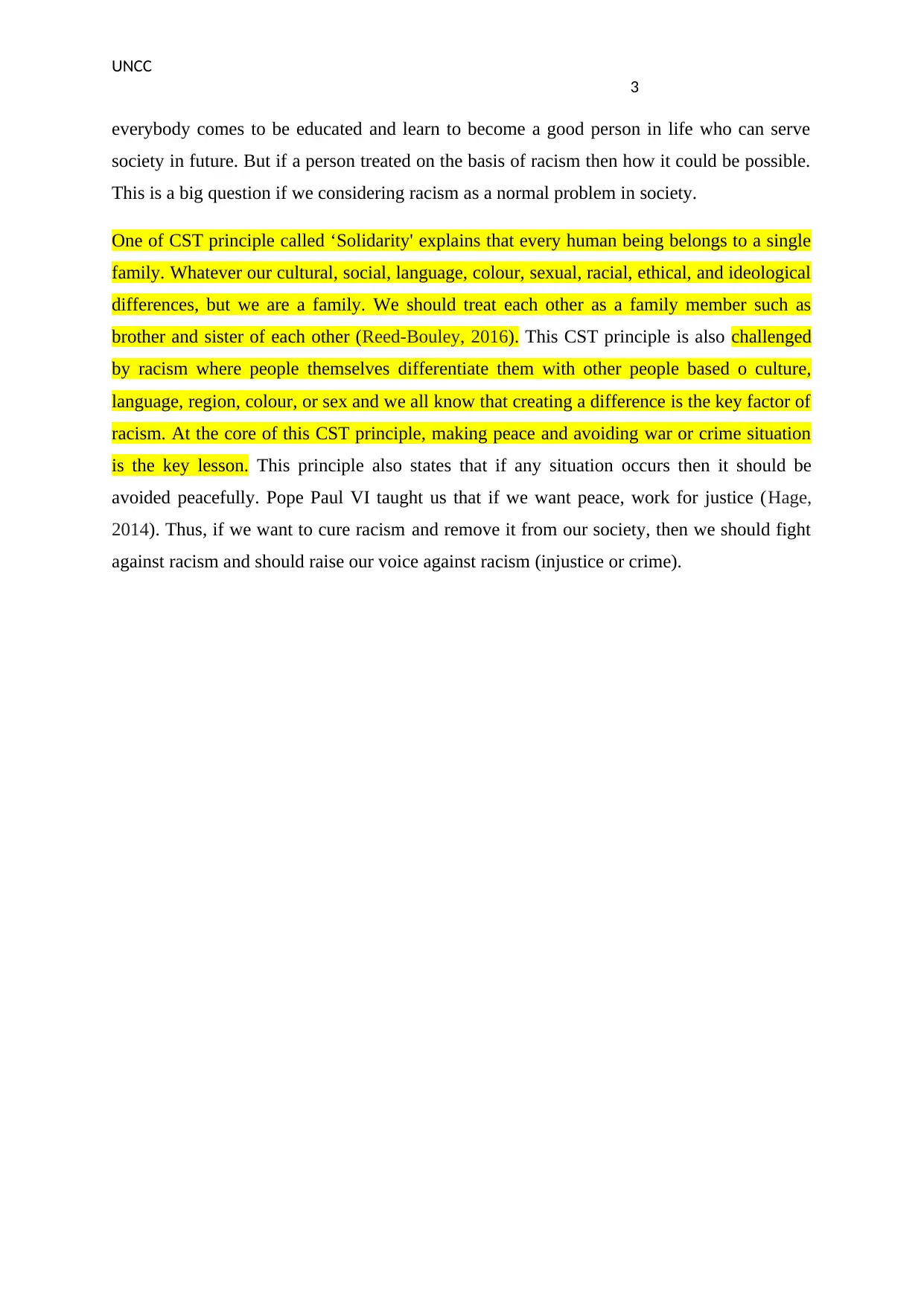
UNCC
3
everybody comes to be educated and learn to become a good person in life who can serve
society in future. But if a person treated on the basis of racism then how it could be possible.
This is a big question if we considering racism as a normal problem in society.
One of CST principle called ‘Solidarity' explains that every human being belongs to a single
family. Whatever our cultural, social, language, colour, sexual, racial, ethical, and ideological
differences, but we are a family. We should treat each other as a family member such as
brother and sister of each other (Reed-Bouley, 2016). This CST principle is also challenged
by racism where people themselves differentiate them with other people based o culture,
language, region, colour, or sex and we all know that creating a difference is the key factor of
racism. At the core of this CST principle, making peace and avoiding war or crime situation
is the key lesson. This principle also states that if any situation occurs then it should be
avoided peacefully. Pope Paul VI taught us that if we want peace, work for justice (Hage,
2014). Thus, if we want to cure racism and remove it from our society, then we should fight
against racism and should raise our voice against racism (injustice or crime).
3
everybody comes to be educated and learn to become a good person in life who can serve
society in future. But if a person treated on the basis of racism then how it could be possible.
This is a big question if we considering racism as a normal problem in society.
One of CST principle called ‘Solidarity' explains that every human being belongs to a single
family. Whatever our cultural, social, language, colour, sexual, racial, ethical, and ideological
differences, but we are a family. We should treat each other as a family member such as
brother and sister of each other (Reed-Bouley, 2016). This CST principle is also challenged
by racism where people themselves differentiate them with other people based o culture,
language, region, colour, or sex and we all know that creating a difference is the key factor of
racism. At the core of this CST principle, making peace and avoiding war or crime situation
is the key lesson. This principle also states that if any situation occurs then it should be
avoided peacefully. Pope Paul VI taught us that if we want peace, work for justice (Hage,
2014). Thus, if we want to cure racism and remove it from our society, then we should fight
against racism and should raise our voice against racism (injustice or crime).
Paraphrase This Document
Need a fresh take? Get an instant paraphrase of this document with our AI Paraphraser
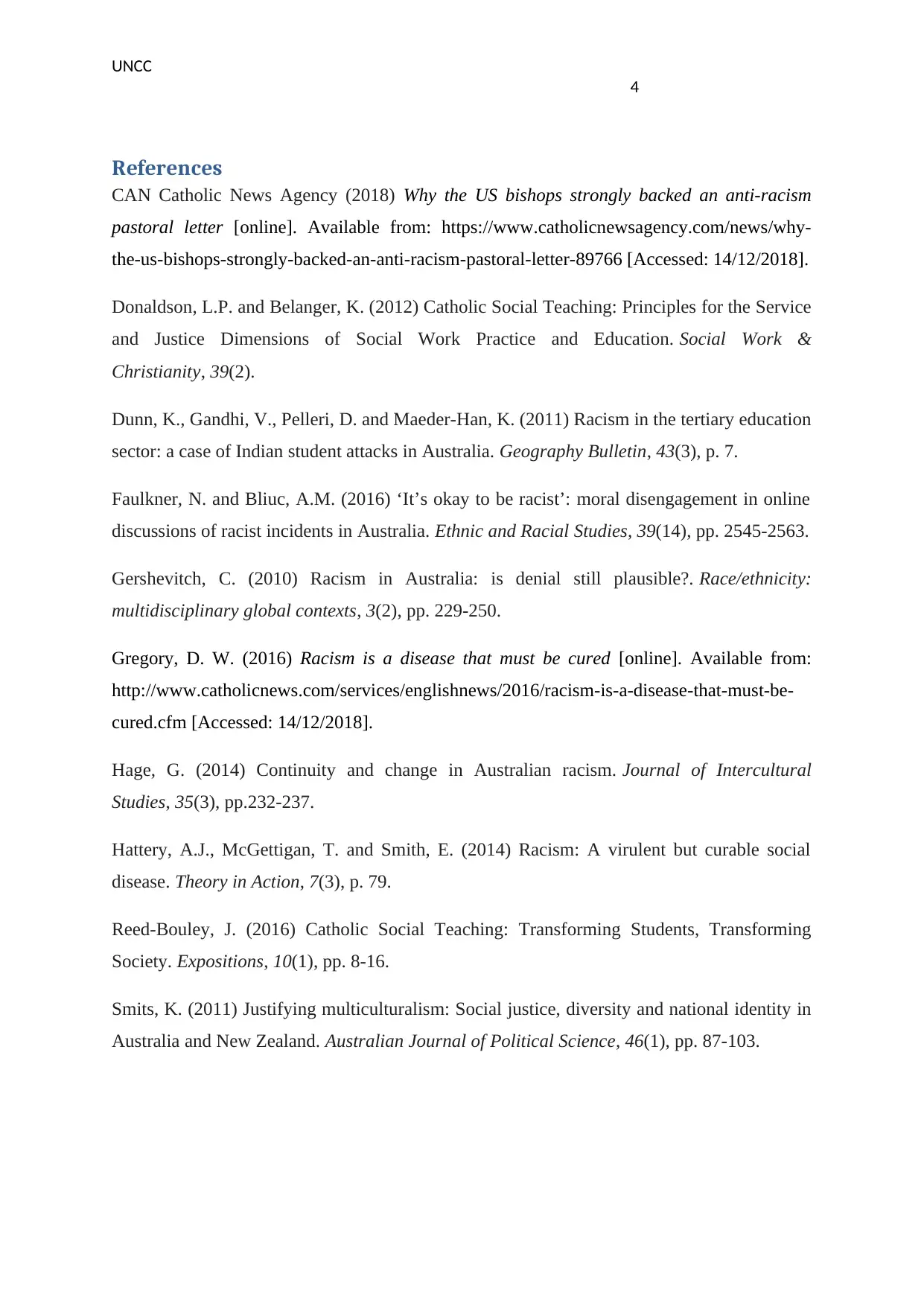
UNCC
4
References
CAN Catholic News Agency (2018) Why the US bishops strongly backed an anti-racism
pastoral letter [online]. Available from: https://www.catholicnewsagency.com/news/why-
the-us-bishops-strongly-backed-an-anti-racism-pastoral-letter-89766 [Accessed: 14/12/2018].
Donaldson, L.P. and Belanger, K. (2012) Catholic Social Teaching: Principles for the Service
and Justice Dimensions of Social Work Practice and Education. Social Work &
Christianity, 39(2).
Dunn, K., Gandhi, V., Pelleri, D. and Maeder-Han, K. (2011) Racism in the tertiary education
sector: a case of Indian student attacks in Australia. Geography Bulletin, 43(3), p. 7.
Faulkner, N. and Bliuc, A.M. (2016) ‘It’s okay to be racist’: moral disengagement in online
discussions of racist incidents in Australia. Ethnic and Racial Studies, 39(14), pp. 2545-2563.
Gershevitch, C. (2010) Racism in Australia: is denial still plausible?. Race/ethnicity:
multidisciplinary global contexts, 3(2), pp. 229-250.
Gregory, D. W. (2016) Racism is a disease that must be cured [online]. Available from:
http://www.catholicnews.com/services/englishnews/2016/racism-is-a-disease-that-must-be-
cured.cfm [Accessed: 14/12/2018].
Hage, G. (2014) Continuity and change in Australian racism. Journal of Intercultural
Studies, 35(3), pp.232-237.
Hattery, A.J., McGettigan, T. and Smith, E. (2014) Racism: A virulent but curable social
disease. Theory in Action, 7(3), p. 79.
Reed-Bouley, J. (2016) Catholic Social Teaching: Transforming Students, Transforming
Society. Expositions, 10(1), pp. 8-16.
Smits, K. (2011) Justifying multiculturalism: Social justice, diversity and national identity in
Australia and New Zealand. Australian Journal of Political Science, 46(1), pp. 87-103.
4
References
CAN Catholic News Agency (2018) Why the US bishops strongly backed an anti-racism
pastoral letter [online]. Available from: https://www.catholicnewsagency.com/news/why-
the-us-bishops-strongly-backed-an-anti-racism-pastoral-letter-89766 [Accessed: 14/12/2018].
Donaldson, L.P. and Belanger, K. (2012) Catholic Social Teaching: Principles for the Service
and Justice Dimensions of Social Work Practice and Education. Social Work &
Christianity, 39(2).
Dunn, K., Gandhi, V., Pelleri, D. and Maeder-Han, K. (2011) Racism in the tertiary education
sector: a case of Indian student attacks in Australia. Geography Bulletin, 43(3), p. 7.
Faulkner, N. and Bliuc, A.M. (2016) ‘It’s okay to be racist’: moral disengagement in online
discussions of racist incidents in Australia. Ethnic and Racial Studies, 39(14), pp. 2545-2563.
Gershevitch, C. (2010) Racism in Australia: is denial still plausible?. Race/ethnicity:
multidisciplinary global contexts, 3(2), pp. 229-250.
Gregory, D. W. (2016) Racism is a disease that must be cured [online]. Available from:
http://www.catholicnews.com/services/englishnews/2016/racism-is-a-disease-that-must-be-
cured.cfm [Accessed: 14/12/2018].
Hage, G. (2014) Continuity and change in Australian racism. Journal of Intercultural
Studies, 35(3), pp.232-237.
Hattery, A.J., McGettigan, T. and Smith, E. (2014) Racism: A virulent but curable social
disease. Theory in Action, 7(3), p. 79.
Reed-Bouley, J. (2016) Catholic Social Teaching: Transforming Students, Transforming
Society. Expositions, 10(1), pp. 8-16.
Smits, K. (2011) Justifying multiculturalism: Social justice, diversity and national identity in
Australia and New Zealand. Australian Journal of Political Science, 46(1), pp. 87-103.
1 out of 5
Related Documents
Your All-in-One AI-Powered Toolkit for Academic Success.
+13062052269
info@desklib.com
Available 24*7 on WhatsApp / Email
![[object Object]](/_next/static/media/star-bottom.7253800d.svg)
Unlock your academic potential
Copyright © 2020–2025 A2Z Services. All Rights Reserved. Developed and managed by ZUCOL.



